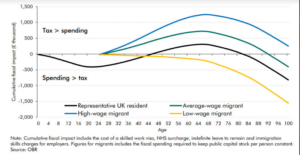The country that gave us The Beatles, Shakespeare and the industrial revolution is in trouble.
The United Kingdom is facing challenges on several fronts: politically, economically, and culturally. So it was bad news when the Office for National Statistics (ONS) recently published their projections for immigration: within the next ten years, the British population will increase with a net number of 5 million people, as 10 million arrive and five million emigrate. This will not go unnoticed.
A report from ONS preditcts that the population will increase with five million people within 2032 because of immigration. The number of British-born inhabitants will decrease due to low birth rates, but this will be offset by almost ten million immgrants who are projected to settle in the country, and when deducting the five million who are expected to leave, we are still left with unprecedented population growth. This will in turn lead to increased pressures on public services, the housing market, and drastically change the demographics of the UK. The Great Britain we once knew, will soon be history.
The main argument for the pro-immigration lobby is that the country needs the labour that immigration provides. They ignore the fact that migrants who end up in low wage jobs, or even in average paid jobs, are an economic burden on society. Last autumn, a report from The Office for Budget Responsibility (OBR) was made public. It shows, in accordance to similar immigration calculations from Norway, that low-paid immigrants are a burden on public finances from the moment they set foot on British soil.
An average, low-paid immigrant will cost the state about one million pounds if they reach the age of 100, and half a million if they reach 80. This is because this type of immigrant requires more economic help from the state, such as healthcare, and pay less in taxes because they earn half of an average wage.

Economy in trouble
The UK doesn’t have an oil fund to lean on, as opposed to Norway. On the contrary – it s dismantling its oil and gas sector, and relies on gas from Norway to back up unstable wind- and solar power. Brits have, as do Germans, some of the most expensive electricity prices in the world. This explains the steady decline in the UK economy; who wants to invest in a country where manufacturing costs the earth?
Net zero, which Labour wants to force through seemingly regardless of the consequences, will in practice mean the move to a pure services economy. When the income from taxes subsequently declines, and the costs increase, the Labour government goes on to increase taxes, which in turn further hinders economic growth. And when the country is facing another five million people who need houses they can’t buy themselves, schools for their children, and medical care, among other things – it becomes a question of what’s possible.
Where will they live? There’s a housing crisis in the country. Not enough houses have been built to meet demand. In London, more than half of those who live in social housing, are immigrants. This feels unfair for Brits who may have workled all their lives, but end up at the back of the queue when they need help.
The hashtag #twotierkier, which describes the way the police and legal system treat indigenous Brits compared to newcomers (ie less favourably), can also be applied to other aspects of society. When asylum seekers and illegal immigrants are allowed to skip the queue to get medical help, is this yet another example of an us-and-them society where certain types of immigrants receive preferential treatment.
Culture matters
It is not just economically the demographic changes will become, and already is, noticeable. Culture matters. Is the culture, or cultures, that accompanies immigration compatible, and enriching, to the existing culture? This is a question with nuanced answers.
Snce 2021, the UK has welcomed 150,000 people from Hong Kong. These have fled from the tight grip of China and are on the whole hard working, educated people who appreciate democracy and freedom of speech (let’s hope Britain is still ahead on that front). They speak good English and have no problems integrating.
People from cultures where the clan is more important than the state, such as Afghanistan, Somalia and other countries in the Middle East, , have shown more difficulty in adjusting to life in the West. Incidents of terrorism, including the Southport massacre, is a case in point. The case of the teacher at Batley Grammar School in northern England, who still lives in hiding several years after showing a picture of the prophet Muhammad is another example.
The feeling of being a stranger in your own country in areas inhabited mostly by non Brits, and where the church bells have been swapped for sirens from the mosques, show that the immigrants don’t blend in, but keep their own culture. There is no doubt this changes the characteristics of the country.
Still, a certain consensus is starting to form. Both legal and illegal migration is a problem, something many on the left also realise. In London, one in 12 people is an illegal immigrant . The Home Office stated that they wish to reduce immigration “considerably” and are working on a plan to “restore order to our broken immigration system,” according to a spokesman. Yet they refuse to put a number on it.
Fumbling in the dark
There is still a lot of fumbling in the dark regarding how to stop the boats that cross the English Channel from France. Starmer promised to “smash the gangs” that organise the people smuggling, but exactly how he will do this is still unknown. Even if there are drowning accidents and the journey is far from safe, the incentives are strong enough for people – especially young men – to risk it. The human rights lawyers that work against deportations are also a part of the problem.
The debate over whether Britain should leave the European Convention of Human Rights has raged for years; many are of the view that illegal immigration would be easier to control if Britain left the ECHR. This will most likely not happen in the next five years, as Labour is firmly opposed to leaving.
Bradley Thomas, an MP from the Conservative Party, suggests that asylum seekers who are successful, should repay any costs that their asylum process incurred. In itself this is unlikely to make a difference, but perhaps, if other economic incentives were cut back, it may have an effect.
The reality is hard to escape, though. Those of us on these islands can expect a considerable rise in immigration in the years ahead. Although the numbers that the ONS are presenting are projections, and the real numbers can both exceed or end up lower. Some parts of the country may not notice the changes as much as others, such as London and the big cities around England. The country as a whole is changing, though, and it is a development that is deliberate – there is no other way to explain what’s been allowed to happen. It’s a development that will make Britons poorer and less safe.
Despite the gloomy outlook – or perhaps because of it – there are political changes afoot. Starmer’s government is one of the least popular governments of modern times, and at the next election Nigel Farage is tipped to become Prime Minister. The US has had its political earthquake – the UK has another five years with Labour before they can vote for change. Until then we will have to stand by and watch as the country continues its course towards the abyss.


